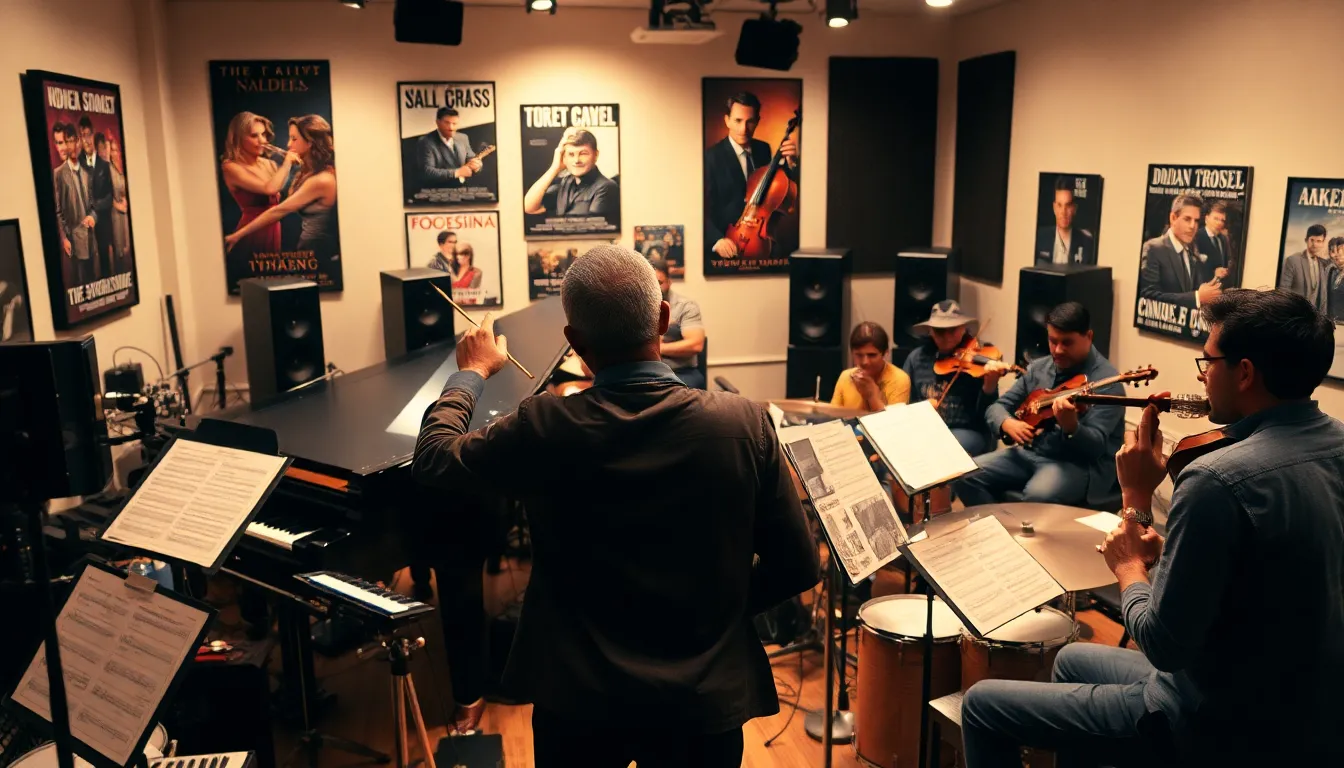Movie soundtracks often steal the spotlight, turning an ordinary film into an unforgettable experience. Picture this: a heart-pounding chase scene, and suddenly, the right music kicks in, sending adrenaline levels soaring. It’s like the musical equivalent of adding a double shot of espresso to your morning coffee. Soundtracks can elevate emotions, create tension, or even make you laugh when you least expect it.
In this article, we’ll dive into the world of movie soundtrack reviews, where the tunes are as crucial as the plot twists. Whether it’s the sweeping orchestras of epic blockbusters or catchy tunes from animated classics, soundtracks deserve their moment in the sun. So grab your popcorn and get ready to explore the melodies that make movies memorable. After all, who doesn’t love a good score—both in music and at the box office?
Table of Contents
ToggleOverview of Movie Soundtrack Reviews
Movie soundtrack reviews critically assess the music that accompanies films, evaluating its impact on viewers. These reviews highlight how soundtracks shape emotions and enhance narratives. They analyze various elements, including composition, instrumentation, and thematic coherence, providing a well-rounded perspective.
Critics examine both original scores and curated song selections. Original scores often include orchestral arrangements, while curated selections may feature popular tracks that resonate with audiences. Each type of soundtrack serves distinct purposes, contributing uniquely to storytelling.
Listeners encounter soundtracks that often drive emotional responses. Specific examples include heart-pounding scores that elevate suspense in thrillers or soft melodies that evoke nostalgia in dramas. Reviewing each piece of music within the context of the film reveals its effectiveness in heightening specific moments.
Not every soundtrack receives universal praise; some generate mixed reviews. Reviews explore common grievances, such as mismatched tone or a lack of innovation. Comparisons to previous successful soundtracks can help contextualize critiques.
Informed opinions enrich soundtrack reviews. Critics reference industry standards, noteworthy composers, and significant trends to support their assessments. Recognizing these influences allows readers to appreciate the intricacies involved in creating compelling movie soundtracks.
Overall, discussions around movie soundtracks reveal their vital role in cinematic storytelling. Reviews encourage audiences to become more aware of the soundscapes surrounding their favorite films and understand the artistry behind the music. By delving into specific examples and critical evaluations, enthusiasts gain a broader appreciation for the genre.
Importance of Soundtracks in Film

Soundtracks serve a crucial role in film, enriching the entire viewing experience. These musical compositions resonate deeply with audiences and can define a movie’s emotional landscape.
Emotional Impact
Music influences emotions profoundly in film. It heightens dramatic moments, evokes nostalgia, and creates anticipation. For example, suspenseful scores build tension, urging viewers to engage more deeply with the narrative. Conversely, soft melodies can induce feelings of tranquility or sadness. Soundtracks also enhance memorable scenes; iconic songs often leave lasting impressions. The emotional depth represented in soundtracks invites audiences to connect with characters on a personal level. Thus, composers craft precise musical cues to support emotional arcs throughout films.
Enhancing Storytelling
Soundtracks play an integral role in storytelling by supporting narratives. They underscore key plot points, helping viewers understand themes and character motivations. Music helps to establish tone and atmosphere; a lively score can set a cheerful ambiance, while a somber piece can cast a dark shadow. Original compositions and curated songs provide a sonic backdrop that shapes viewer perception. Layered instrumentation adds richness, creating immersive experiences that transport audiences into the film’s world. As a result, soundtracks become essential tools for filmmakers looking to convey complex stories effectively.
Highlights of Notable Soundtracks
Movie soundtracks significantly impact viewers’ experiences and emotions. Analyzing notable examples reveals the breadth of creativity in film music.
Classic Film Soundtracks
Classic film soundtracks establish timeless connections with audiences. Soundtracks like “Star Wars,” composed by John Williams, blend orchestration and thematic motifs to create a sense of adventure. Similarly, Ennio Morricone’s work in “The Good, the Bad and the Ugly” showcases how music can enhance tension and highlight key moments. Each of these scores constructs an identity that persists beyond the film itself. The iconic melodies resonate widely, linking generations of fans to their cinematic experiences.
Contemporary Soundtrack Innovations
Contemporary soundtracks continuously evolve, incorporating diverse musical styles. Soundtracks from films like “Black Panther” exemplify this trend by fusing traditional African music with contemporary genres. Many soundtracks today feature collaborations between established composers and popular artists, enriching the listening experience. The innovative approach of combining scores with curated tracks transforms film music into a dynamic mix. Such soundtracks often reflect current cultural themes and resonate with younger audiences, showcasing their powerful influence on modern cinema.
Critique Approaches in Reviews
Critique approaches play a crucial role in assessing movie soundtracks. They help understand how music influences the cinematic experience.
Musical Composition Analysis
Music composition analysis examines distinct elements like melody, harmony, and rhythm. Each component reveals how effectively a soundtrack supports a film’s narrative. Alternatively, themes woven throughout a score can evoke specific emotions. Critics frequently compare orchestral arrangements with popular song selections, noting their different impacts. For instance, an original score often heightens dramatic tension, while curated music drives character development. Observing transitions within a composition allows reviewers to evaluate pacing, ensuring the soundtrack aligns with the film’s flow. Overall, a thorough composition analysis highlights the intricacies that define a memorable movie soundtrack.
Cultural Significance
Cultural significance emphasizes how soundtracks resonate beyond the screen. They often reflect societal values, trends, and historical contexts. Audiences connect deeply with music that mirrors their experiences, influencing their emotional reactions. For example, soundtracks featuring diverse musical styles can showcase multiculturalism. This diversity may enhance a film’s appeal to various demographics. Critics highlight the importance of soundtracks in capturing specific eras, contributing to a film’s authenticity. In many cases, iconic scores become roots of popular culture, inspiring subsequent artists and creators. Such cultural connections underscore the soundtrack’s role as an integral part of film storytelling.
Movie soundtracks are more than just background music; they are essential elements that shape the viewing experience. By enhancing emotions and supporting narratives, soundtracks elevate films to new heights. The artistry behind these compositions deserves recognition and appreciation.
Critics play a crucial role in evaluating soundtracks, offering insights that help audiences understand their impact. From classic scores to contemporary innovations, each soundtrack contributes uniquely to storytelling. As viewers become more aware of the music that accompanies their favorite films, they can deepen their connection to the cinematic world. Embracing the power of soundtracks opens up a richer understanding of film as an art form.




